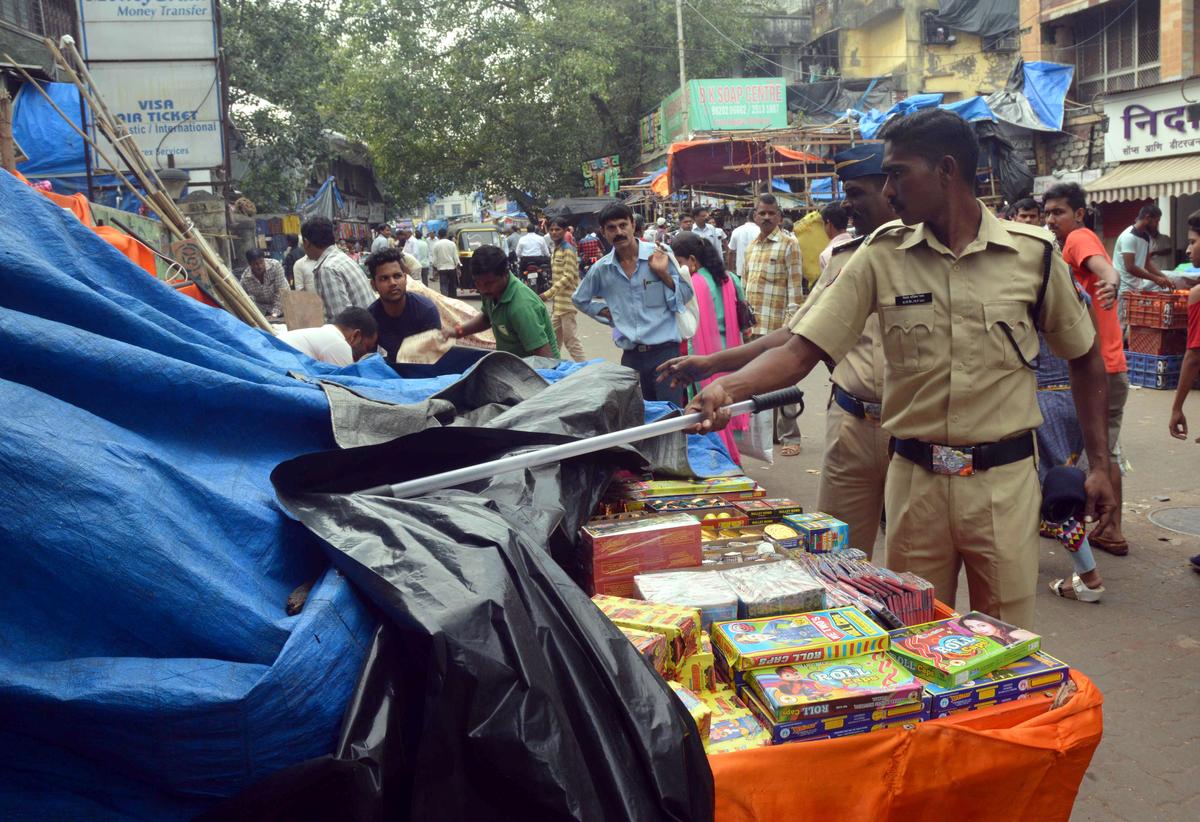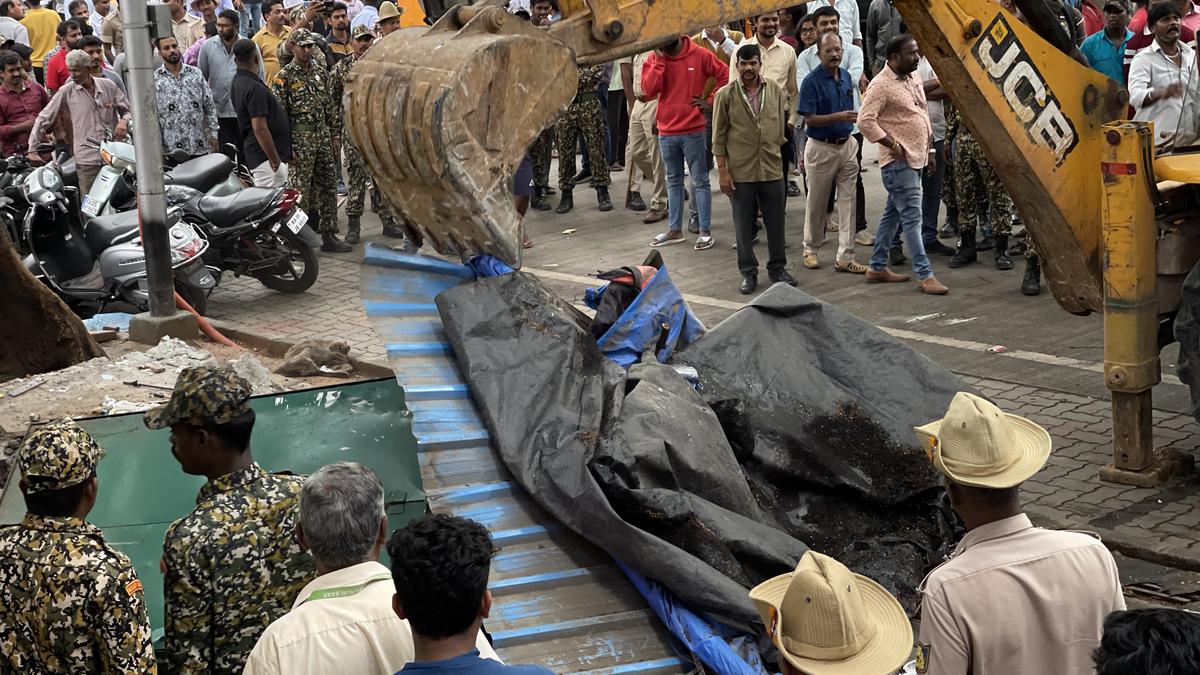Tension has been mounting across several bustling stretches of Bengaluru as the Greater Bengaluru Authority (GBA) initiated removals of what it calls “unauthorised” street vendor stalls, sparking outrage and distress among local hawkers. Many vendors, who depend entirely on daily earnings, claim the action is abrupt, unfair, and deeply damaging to their livelihood. The GBA, however, argues that the operation is essential to resolve traffic congestion, enforce pedestrian safety rules, and restore regulated public spaces. The conflicting perspectives have now evolved into a full-scale debate over urban rights, informal economies, governance, and the ethics of sudden regulatory enforcement.
Street vendors operating across key market hotspots such as Shivajinagar, K.R. Market, Majestic, Gandhi Bazaar, and Malleswaram expressed shock as officials arrived with eviction teams. Cardboard kiosks, tin-roofed stalls, fruit carts, and roadside tea counters were dismantled or marked for removal. Many vendors claimed they were not given sufficient notice, causing panic and chaos as they scrambled to salvage goods. Several stalls were destroyed before owners could react, leaving vendors not only without a workspace but also with damaged inventory worth thousands of rupees. For daily wage sellers, this loss is more than economic—it is a blow to dignity and stability.
The sudden enforcement comes amid growing complaints from commuters, local businesses, and resident associations who argue that too many informal stalls are occupying public pathways. They claim that street vending has gradually spilled beyond designated stretches and turned busy sidewalks into narrow passages, forcing pedestrians to walk on roads and risk accidents. On the other hand, street vending unions counter that Bengaluru has failed to map vending zones and issue proper licenses, leaving vendors trapped between informal survival and legal vulnerability. They argue that many stalls labelled “unauthorised” are actually awaiting pending registrations or approvals.
Opinions among ordinary citizens are split. While some commuters appreciate the effort to clear congested footpaths, others sympathise with the vendors who play a crucial role in Bengaluru’s everyday culture. The city’s street vending ecosystem provides affordable food, daily household products, clothing, accessories, and essential services like key-making and phone repairs. For economically weaker sections, these vendors form an indispensable social network. Removing them abruptly, critics argue, disrupts urban inclusivity and widens the gap between privileged consumers and those who survive on informal labour. This ethical dimension has deepened emotional reactions across the city.
Street vending unions have labelled the removals “selective targeting” and “anti-poor governance.” They insist that the GBA should follow national Street Vendors (Protection of Livelihood and Regulation of Street Vending) Act norms, which mandate surveys, vending committees, and warning notices prior to demarcation and eviction. Several vendors allege that the crackdown favours elite business lobbies who want streets free of informal competition. They question why traffic violations by private vehicles or encroachments by high-end establishments are not met with the same urgency. These allegations underscore long-standing debates about which stakeholders urban development should prioritise.

Clashing Rights: Vendors Demand Legal Process, Not Sudden Force
Street vendor associations in Bengaluru argue that the law clearly requires authorities to first conduct a citywide survey of vending stations before declaring stalls as illegal. They say that the GBA has not completed this survey transparently, leaving tens of thousands of vendors operating without clarity. Many vendors have applied for identity cards and vending licenses but claim they have been waiting months or even years for official approval. Without documentation, they remain easy targets for eviction. This deadlock, activists argue, is not merely administrative negligence but a failure to recognise informal workers as legitimate contributors to urban life.
The vending unions are now demanding that the GBA immediately halt the removal operations and begin dialogues with vendor representatives. They propose a collaborative mapping exercise that can designate vending stretches without harming public movement or street commerce. According to them, an inclusive plan could benefit vendors and pedestrians alike. They point out that many metropolitan cities across the world have successfully integrated street vending using regulated clusters, timings, rotating slots, and uniform stall sizes. Bengaluru, they argue, can become a model city if it shifts from punitive action to creative planning. They also warn that aggressive enforcement may drive vendors into confrontation.
The GBA maintains that footpath misuse has reached unsustainable levels. Officials assert that they have been issuing warnings for months and that vendors who received verbal and written alerts ignored them. They report that many stalls had spread beyond acceptable limits, blocking drains, piling garbage, and posing fire hazards due to unsafe cooking equipment. Some vendors also allegedly encroached on road margins in busy traffic junctions. For GBA officials, eviction is a last-resort corrective measure. They insist that civic bodies are not anti-poor but must protect public space access, which is a right of all citizens, not just vendors.
The debate has resulted in emotional confrontations between vendors and officials during some eviction drives. Videos recorded locally show hawkers pleading, crying, or arguing with personnel as their stalls are dismantled. Small-time flower sellers and fruit vendors expressed that losing a day’s trade means losing essential funds for household expenses. Many of them said they live hand-to-mouth, without savings. For them, working on the street is not a choice but a compulsion due to lack of formal job opportunities. The eviction, therefore, becomes a question of livelihood survival rather than regulatory compliance.
Activists working with informal workers say that Bengaluru’s governance is increasingly reflecting “elite urbanism,” where cosmetic beautification dictates policy decisions. They argue that the crackdown prioritises a polished city image over social equity. They emphasise that informal workers are the backbone of urban affordability, making services accessible to students, labourers, migrants, and low-income residents. For these communities, street shops are not just convenience—they are economic lifelines. Removing vendors without creating designated spaces, activists warn, will push the urban poor further into insecurity, and possibly illegal networks of bribery or exploitation.
Whose Streets? A City Forced to Decide Between Order and Livelihoods
The larger issue growing from these removals is the question of who owns or controls public space. Some civic experts argue that policies must balance multiple rights—pedestrian freedom, public health, traffic movement, and livelihood security. They say the solution lies not in eviction but in structured vending zones, barricaded stations, time-based vending licenses, and waste management guidelines. They propose that local skill training and cooperative models could ensure vendors follow rules while earning sustainably. Such an approach would treat vendors as participants in city-building, not obstacles.
The Bengaluru police department has also been drawn into the controversy, as vendors claim that sudden evictions increase their vulnerability to bribery and harassment. They argue that when stalls become “illegal,” officials gain discretionary power to exploit them. Some vendors allege that informal payments are sometimes demanded to allow them to operate. If licensing remains unimplemented, unions say that corruption will flourish under the guise of enforcement. Police officials have denied such accusations but agree that clear regulations would reduce street tensions and arbitrary decision-making, benefiting both vendors and officers.
Resident welfare groups supporting the crackdown have defended the GBA’s intervention, saying that street vending has expanded beyond tolerable limits. They cite examples of people struggling to walk on congested pavements or visually impaired individuals finding it difficult to navigate footpaths filled with carts and goods. They emphasise that the city must first protect pedestrian rights, especially as Bengaluru plans to become more walkable and public transport-oriented. They argue that vending must not come at the cost of safety, cleanliness, or universal accessibility. They insist that regulation does not equal removal—it simply demands order.
As emotions continue to rise, the question now is whether the government will pursue confrontation or collaboration. Many Bengaluru residents recognise the cultural and economic value of vendors and want solutions that offer coexistence, not exclusion. Experts believe that harassment, demolition, and sudden evictions are unsustainable strategies that only deepen inequality. While informal markets may appear disorderly, they reflect the social needs of the majority. For any real change, governance must engage with lived realities rather than enforcing top-down planning models borrowed from cities with far fewer informal workers.

Vendors and trade unions are likely to intensify their agitation if the crackdown continues without negotiation. Representatives have warned of protests across major markets, which may affect city traffic and disrupt business ecosystems. Analysts caution that both sides stand to lose if conflict escalates. For vendors, prolonged protests mean lost income; for the government, worsening public optics and pressure from labour rights groups could damage credibility. The success of any policy will depend on consensus, not coercion. The coming weeks will serve as a critical test of whether Bengaluru can craft an urban policy that respects its people as much as its pavements.
Vendors and trade unions are likely to intensify their agitation if the crackdown continues without negotiation. Representatives have warned of protests across major markets, which may affect city traffic and disrupt business ecosystems. Analysts caution that both sides stand to lose if conflict escalates. For vendors, prolonged protests mean lost income; for the government, worsening public optics and pressure from labour rights groups could damage credibility. The success of any policy will depend on consensus, not coercion. The coming weeks will serve as a critical test of whether Bengaluru can craft an urban policy that respects its people as much as its pavements.
Follow: Karnataka Government
Also read: Home | Channel 6 Network – Latest News, Breaking Updates: Politics, Business, Tech & More

